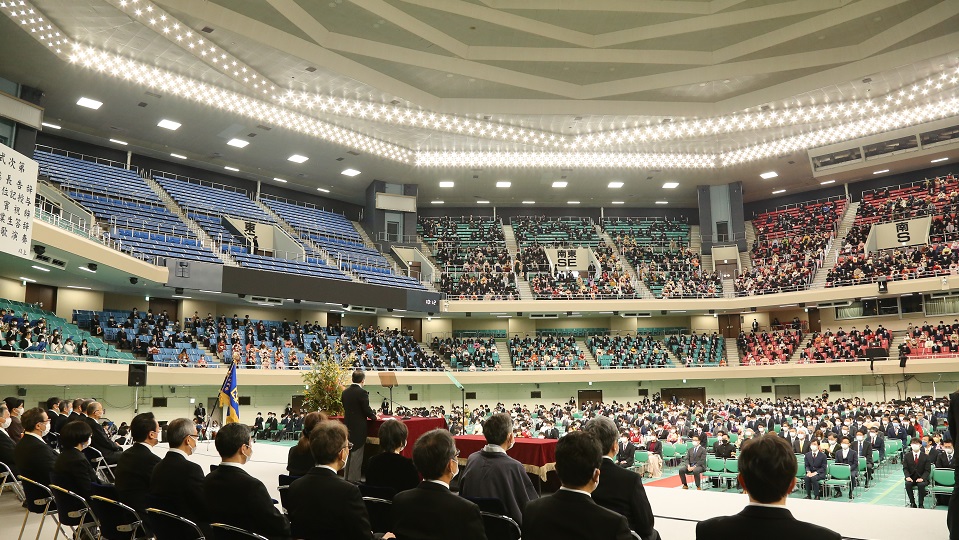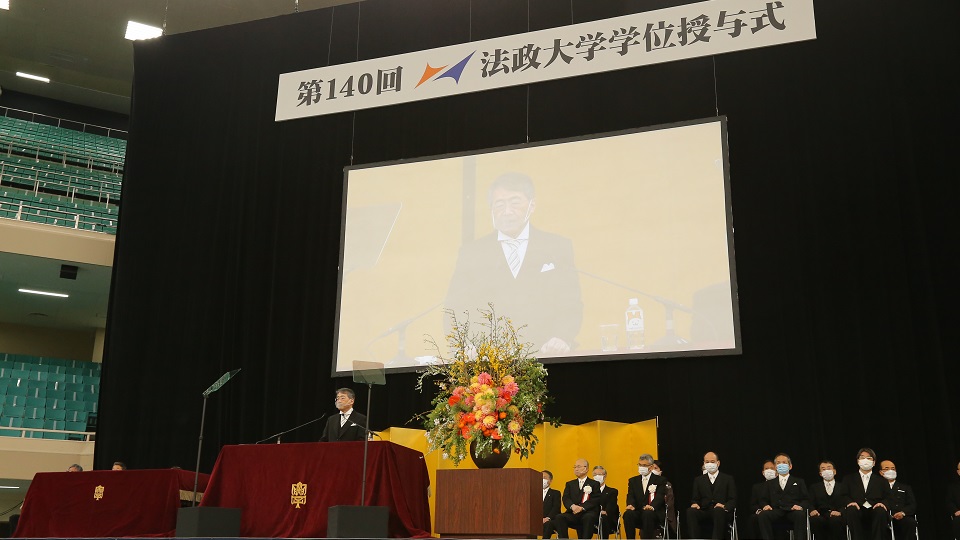News & Event
President’s Address to the March 2022 Hosei University Commencement Ceremony
Congratulations to all of you, the 2022 graduating class of Hosei University’s undergraduate and graduate programs! And congratulations to all family members who could not join us in person today. Unfortunately, we had to limit the number of seats as a Covid precaution, and we appreciate your understanding.
The last two years of your lives as students were spent during the pandemic. For undergraduate students, that means that half of your student tenure—no small length of time, by any means—was placed within all sorts of constraints. And for many of our master’s program students, that means that the entire duration of your program was spent during the pandemic. You are coming to today’s commencement ceremony having led a university life vastly different from what you expected it would be when you enrolled. I imagine that, while you certainly feel a sense of achievement in reaching this milestone, you come with mixed feelings that you can’t quite put into words. I bet there is no one here who does not feel some regret for not doing or not being able to do things they had their heart set on doing, had there been no pandemic.
The faculty share similar feelings. They began the pandemic, particularly the 2020 school year, scrambling to adjust to the new normal. It took time for them to find some degree of success in resuming university activities. My sense is that it a took a long time for you students to adapt to the situation as well. All undergraduate students began the pandemic after first experiencing pre-pandemic life in your first and second years. And our graduate students remember what pre-pandemic student life was like from your time as undergraduates. Just when you were taking new steps in your academic studies or research, a crisis unfolded and you were faced with decisions about how to adjust and continue your studies or research in spite of it. From that time until now, the moment of obtaining your degree, was shared between you and Hosei University. Today’s ceremony is the product and culmination of our time together.
To start off, I would like to pay special respects to you all for having overcome the challenges of the pandemic to get to this point. No one, I’m sure, could complete their studies within these extraordinary circumstances without extraordinary effort. We faculty and staff of Hosei University, having gone through this time with you, recognize and appreciate the value of your work. And we are delighted to send you off into the world today.
The emergence and outbreak of a new virus is undoubtedly an unwelcome event. But that event happened to us regardless. It fell down on us, in the midst of our everyday lives, as a phenomenon we have little control over. We had no choice about whether accept or reject it. Try as we might, rejecting it would not change reality. Most people generally understand that circumstances like this sometimes happen, out there in the world or in the human lifetime. We know that such events have happened to other people in the past. But rarely do we have the opportunity to experience such events for ourselves—to feel their impact and to think seriously about how we want to live our own lives.
And yet, the unique set of conditions that began two years ago and continue even now exist as a real and present problem for everyone. We find ourselves having to think about and decide our path forward in life, all while directly impacted by these circumstances without our consent. In those moments of studying for your respective programs, and in the moments of choosing your future trajectory, you are given choices that carry a different kind of weight than what your predecessors faced when graduating during “normal,” pre-Covid times. And the choices you made, and will make, will determine your life’s course tomorrow and in the days to come.
It bears mentioning that the free movement and exchange of people within and between countries, which is the result of past socioeconomic and cultural development and will be an essential platform for socioeconomic and cultural activities going forward, helped accelerate the virus’s spread. An aspect of modern society that until the pandemic generated economic and cultural prosperity we all enjoyed became a catalyst for disaster. What was once normal—the ability to freely travel and interact with people in various settings—has been heavily restricted as a way to keep the virus from spreading, and those restrictions continue even now.
We are now in a situation where we must think seriously about something we have lost and took for granted before the pandemic: the value society gives us and how society impacts us because of how it’s designed. It is valuable and important to take a fresh, bird’s eye view of the world in which we live, and to consider the meaning and value—and limitations—of our own place in that world. The state of the world is not some natural phenomenon that exists outside our control; it is something we can change through will and action, and its current manifestation is the result of many previous decisions and actions by people. Our duty in this age is to reimagine those aspects of society we can change, and to pursue our vision of the future while working within the limits we cannot change. When the status quo no longer works, what should we keep and what should we change? The power of any one person to make change through their decisions and actions is small, but nobody exists in isolation: our decisions and actions are connected. The state of the world is settled over time through this kind of relationship.
Before the pandemic, society created prosperity in many forms, and it was perhaps possible to live life simply as a consumer of such prosperity, solely receiving its benefits. Or, since such prosperity was not necessarily distributed equally to everyone, one could live life as a bystander, either unwillingly or by conscious choice. However, the position we find ourselves in now is one where the future will be shaped by our collective choices and actions. We are now required to live as people who are directly responsible, and this is something we must realize. Rather than simply getting swept up by conditions, let’s create a better future together through a collective commitment to making choices that matter. That is the desire I want to share with you all as we look to the future.
Essentially, I think the same can be said regarding the problems caused by Russia’s recent invasion of Ukraine. The international principles and social order that have been upheld since the second half of the 20th century will not continue to be the “norm” going forward without some form of effort to protect them. All of us here today will eventually live out whatever future those efforts entail. And if that’s the case, what can we do to rebuild the norms that we want our future to have? That is the question being asked of us. I will say it again: “Rather than simply getting swept up by conditions, let’s create a better future together through a collective commitment to making choices that matter.”
At some point, the pandemic will end and we will enter the post-Covid era. When looking back from that point in time, the experiences of sharing the experiences of 2020 and 2021 will remain etched in the memories of everyone at Hosei University today, including not only you, the graduating class of 2022, but also your fellow students who will graduate after you, as well as faculty and staff.
When the pandemic will end none of us can know for sure. But history tells us that it will end at some point and in some form. As we part ways, my hope is that you arrive at the end of the pandemic in full health and that the long path of life that awaits you is a magnificent one. Best wishes to you all!



